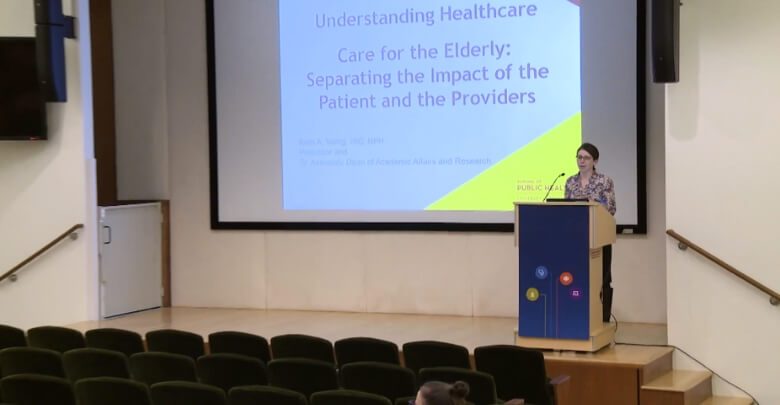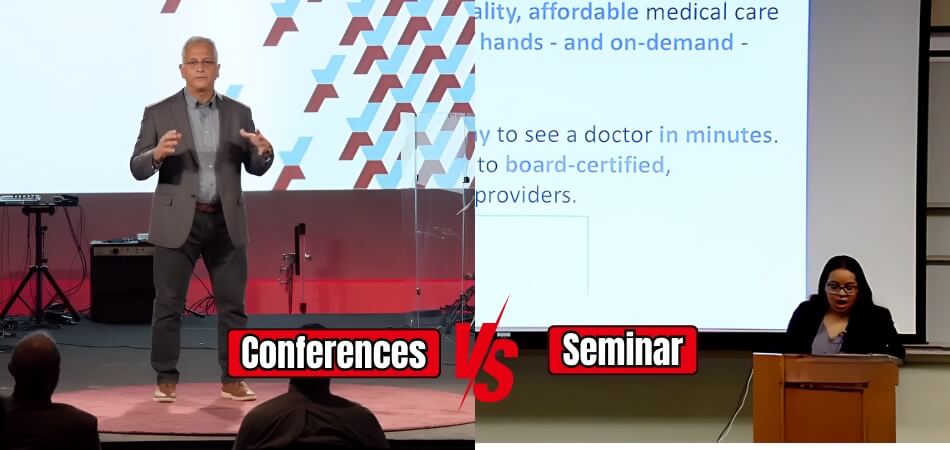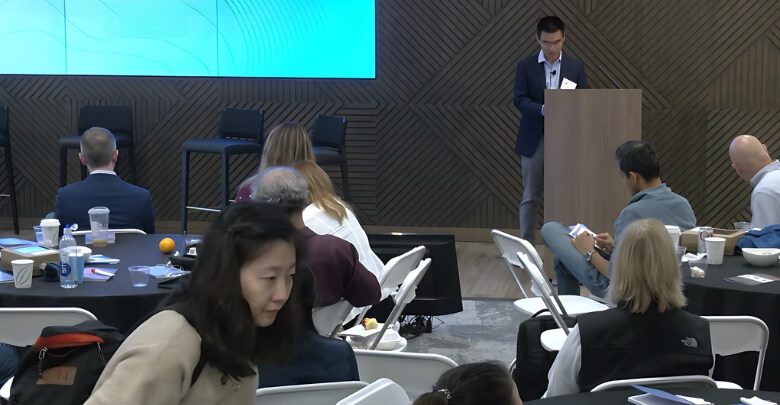When it comes to professional development, you’ll usually come to encounter healthcare conferences and seminars, each with its own set of perks. A common question that most people ask: What is the difference between a healthcare conference and a seminar?
A healthcare conference spans multiple days, featuring diverse sessions and networking, focusing on industry-wide trends. A seminar is shorter, focusing intensely on specific topics or skills, often with interactive sessions led by experts in a particular field.
Curious about which might be the best fit for your needs? Follow along as we explore deeper into the key differences, benefits, and how to choose the right one for you.
Healthcare Conferences and Seminars: What Are These?
Healthcare conferences and seminars play a major role in the continuous education and professional development of medical practitioners. These events serve as platforms for sharing knowledge, discussing innovations, and networking with peers. Here, we are going to discuss the healthcare sector and healthcare seminars.

Healthcare Conference
Attending a healthcare conference offers a wealth of opportunities. These events bring together professionals from various fields to discuss advancements and share insights. They are essential for staying updated on industry trends.
Healthcare conferences typically span several days, packed with various sessions. Each session covers different topics, allowing attendees to gain a broad perspective on current issues. Networking opportunities abound, enabling professionals to connect and collaborate.
The agenda often includes keynote speeches, panel discussions, and workshops. Most health care conferences 2024 Canada feature renowned experts to lead these sessions, sharing their knowledge and experiences. The focus is on bringing up a collaborative environment where new ideas can flourish.
Healthcare Seminar
Participating in a healthcare seminar provides a more focused learning experience. These events concentrate on specific topics, offering in-depth knowledge and practical skills. They are ideal for professionals looking to specialize or gain detailed insights.
Seminars are usually shorter, often lasting a day or two. This condensed format allows for intensive learning and direct interaction with experts. Participants can engage in hands-on activities and discussions, improving their understanding.
Interactive sessions are a hallmark of seminars, promoting active participation. Experts lead these sessions, providing real-world applications and case studies. The goal is to equip attendees with actionable skills they can apply in their practice.
What is the Difference Between a Healthcare Conference and a Seminar?
The main differences between a healthcare conference and a seminar lie in their Scope and Focus, Scale and Format, audience engagement, Purpose and Goals, and Interaction and Networking.
Scope and Focus
- Conference: A healthcare conference typically covers a wide array of topics within the healthcare industry. It serves as a platform for professionals from various sectors to gather, exchange knowledge, and discuss trends. Conferences often feature keynote speakers, panel discussions, and multiple sessions running simultaneously on different topics.
- Seminar: a healthcare seminar is more narrowly focused. It zeroes in on a specific theme, issue, or topic within healthcare. Seminars are designed to search deeply into the subject matter, offering detailed insights, research findings, or specialized training.
Scale and Format
- Conference: Conferences are larger in scale compared to seminars. They can span several days and accommodate hundreds to thousands of attendees. Conferences typically have a structured agenda with plenary sessions (main sessions attended by all participants), breakout sessions (smaller sessions focusing on specific topics), and various networking opportunities.
- Seminar: Seminars are more compact and usually shorter in duration. They may last a few hours to a full day, depending on the depth of the topic being covered. The format of a seminar often includes presentations by one or a few speakers, followed by discussions and interactive sessions with participants.
Audience Engagement
- Conference: Conferences attract a diverse audience, including healthcare professionals, researchers, policymakers, and industry representatives. One of the must-know healthcare conference facts is that a diverse range of topics covered at a health care conference. From advanced research to policy discussions, attendees have chances to learn from experts.
- Seminar: Seminars typically draw a smaller, more targeted audience interested specifically in the seminar’s topic. Audience engagement in seminars is often more intensive, focusing on in-depth discussions, sharing of insights, and sometimes hands-on activities related to the topic.
Purpose and Goals
- Conference: The primary goal of a healthcare conference is to provide a comprehensive platform for learning, networking, and exploring new developments in the field. Conferences aim to encourage collaboration, showcase innovative research, and discuss challenges and opportunities facing the healthcare industry as a whole.
- Seminar: Seminars are geared towards deeper exploration of a particular aspect of healthcare. They aim to provide focused knowledge, facilitate discussions on specific issues, and sometimes offer practical training or skills development related to the seminar’s theme.
Interaction and Networking
- Conference: Conferences offer extensive opportunities for networking due to their large-scale nature. Attendees can interact with a wide range of professionals, explore collaborative opportunities, and build connections that extend beyond the event itself.
- Seminar: Seminars encourage more intimate interactions among participants. The smaller group size allows for deeper connections and meaningful exchanges of ideas between attendees and speakers.
What Are the Typical Topics Covered in Healthcare Seminars?
Healthcare seminars offer an in-depth exploration of vital themes in the medical field. These events are tailored to improve knowledge and practical skills. Each seminar focuses on specific, critical areas to help professionals stay updated.
New Medical Technologies
Innovative medical technologies are often the highlight. Experts discuss advancements like robotic surgery, telemedicine, and AI in diagnostics. Seminars provide detailed presentations on how these technologies transform healthcare. Participants learn through case studies showcasing real-world applications.
Clinical Practices
Improving clinical practices is a frequent seminar topic. Attendees explore evidence-based approaches and best practices. Interactive sessions often include hands-on activities and demonstrations. These seminars help clinicians refine their skills and stay current.
Patient Care Strategies
Patient care strategies are crucial in healthcare seminars. These sessions focus on improving patient outcomes and satisfaction. Experts share strategies for effective communication, empathy, and patient engagement. Real-life scenarios and role-playing exercises often illustrate these concepts.
Policy Developments
Policy developments in healthcare are another significant topic. Seminars address changes in regulations and their impact on practice. They provide insights into compliance, healthcare laws, and ethical considerations. Discussions often include topics covered in healthcare conference panels for broader perspectives.
Case Studies and Interactive Sessions
Case studies and interactive sessions are integral to these seminars. Real-world cases help illustrate complex concepts. Interactive elements like Q&A sessions and group discussions encourage engagement. Participants gain a deeper understanding through practical, hands-on learning.
How Do Healthcare Conferences and Seminars Impact Professional Development?
Healthcare conferences and seminars play a crucial role in professional development. They provide invaluable learning experiences and networking opportunities. Here’s explore how these events impact professional growth and career advancement.
Learning from Industry Leaders
Attending these events allows professionals to learn from leading experts. Gaining insights through understanding healthcare conference topics helps participants explore new ideas in depth. Industry leaders share their knowledge on innovative topics, offering practical solutions and future trends. This exposure helps attendees stay ahead of the curve and fosters significant professional growth.
Gaining Insights Into Emerging Trends
These events highlight the latest trends in healthcare. Participants gain insights into new technologies and practices. Identifying these patterns enables professionals to adapt and innovate. Staying updated with trends is essential for maintaining relevance in the field.
Earning Continuing Education Credits
Healthcare professionals can earn continuing education credits at these events. These credits are necessary for maintaining certifications and licenses. Earning credits ensures professionals meet industry standards. Continuing education also demonstrates a commitment to ongoing learning.
Networking with Peers and Collaborators
Conferences and seminars offer excellent networking opportunities. Attendees can connect with peers and potential collaborators. These connections can lead to new job opportunities or partnerships. Networking improves career prospects and professional relationships.
Improving Career Prospects
Participation in these events boosts a professional’s resume. Employers value continuous learning and industry engagement. Gaining new skills and knowledge improves job performance. Ultimately, these events can lead to career advancement and success.
FAQs About What Is the Difference Between a Healthcare Conference and A Seminar?
Recognizing the differences between healthcare conferences and seminars can help you optimize your professional development opportunities. Here are some frequently asked questions to guide you.
How Long Do Healthcare Conferences and Seminars Typically Last?
Healthcare conferences usually span several days, offering numerous sessions and networking events. On the other hand, seminars are shorter and can last from a few hours to a full day. This makes seminars more intensive and focused.
Who Should Attend Healthcare Conferences?
Healthcare conferences suit a diverse audience, including professionals, researchers, policymakers, and industry representatives. They provide a platform for networking and knowledge exchange. These events are ideal for those looking to stay informed about broad industry trends.
Who Should Attend Healthcare Seminars?
Healthcare seminars are best suited for professionals seeking in-depth knowledge on specific topics. They are perfect for those wanting to specialize or improve their skills in particular areas. Seminars offer a more personalized learning experience.
What Are the Networking Opportunities Like at These Events?
Networking at healthcare conferences is extensive due to the large number of attendees and diverse sessions. Conferences offer formal and informal networking opportunities. In contrast, seminars provide more intimate networking with focused, like-minded professionals.
How Do I Choose Between a Conference and A Seminar?
Choosing between a conference and a seminar depends on your learning objectives. If you seek a broad understanding and networking opportunities, attend a conference. For detailed, topic-specific knowledge, a seminar is the better choice.
Bottom Line
Healthcare conferences and seminars each provide distinct benefits geared toward certain professional objectives. Conferences offer many opportunities for learning, networking, and researching industry trends. Network with diverse experts and gain a complete understanding of the healthcare industry at these events.
However, Seminars provide in-depth knowledge and practical skills in a shorter time frame. They are perfect for professionals looking to specialize or gain detailed insights into particular areas of healthcare. Interactive sessions and hands-on activities make seminars a valuable learning experience.
So, what is the difference between a healthcare conference and a seminar? lies in their scope, format, and the opportunities they offer. Both are crucial for professional development, helping healthcare professionals stay current, network, and advance their careers.







